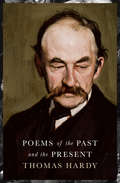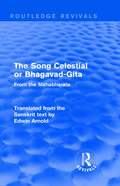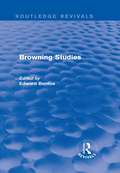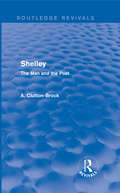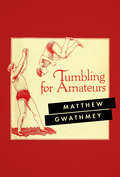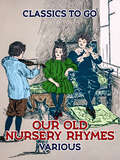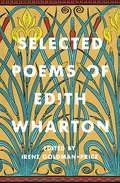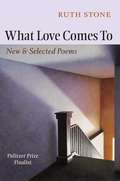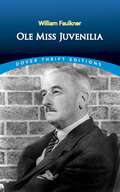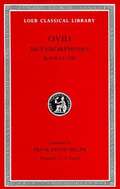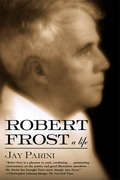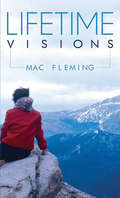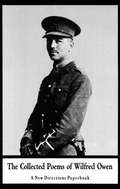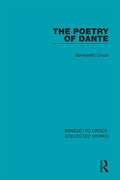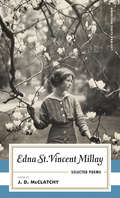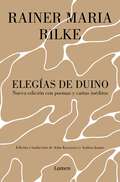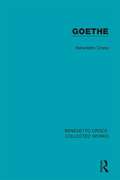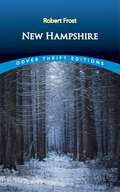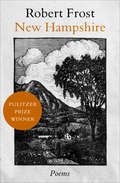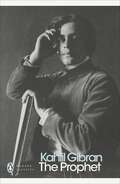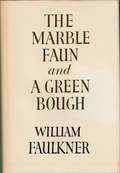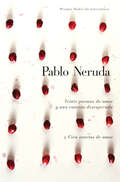- Table View
- List View
Poems of the Past and the Present (Collected Works Of Thomas Hardy)
by Thomas HardyThe second collection of poetry from the author of such classics as Tess of the D&’Urbervilles and Far from the Madding Crowd.Although well known for his novels, like Jude the Obscure, Thomas Hardy also wrote poetry throughout his life. Poems of the Past and the Present is Hardy&’s second volume of poetry, originally published in 1901. This wide-ranging collection is divided into five sections: War Poems, Poems of Pilgrimage, Miscellaneous Poems, Imitations, Etc., and Retrospect. It features some of Hardy&’s finest work, including &“At a Lunar Eclipse,&” &“The Darkling Thrush,&” &“The Ruined Maid,&” &“The Self Unseeing,&” &“The Well-Beloved,&” and &“Drummer Hodge&” (originally titled &“The Dead Drummer&”).
Routledge Revivals: From the Mahabharata (Routledge Revivals)
by Edwin ArnoldFirst published in 1909, this book presents an English translation of chapters 25-42 of the Bhishma Parva from the epic Sanskrit poem Mahabharata — better known as the Bhagavad-Gita, reckoned as one of the "Five Jewels" of Devanagari literature. The plot consists of a dialogue between Prince Arjuna and Krishna, the Supreme Deity, in a war-chariot prior to a great battle. The conversation that takes place unfolds a philosophical system which remains the prevailing Brahmanic belief, blending the doctrines of Kapila, Patanjali, and the Vedas. Building on a number of preceding translations, this highly-regarded poetic interpretation provides a major work of literature in an accessible popular form.
Browning Studies: Being Select Papers by Members of the Browning Society (Routledge Revivals)
by Edward BerdoeThis title, first published in 1909, presents a selection of the most important essays by members of the renowned Browning Society, which existed to promulgate the works of and appreciation for perhaps the greatest English poet of the Victorian Age. Browning’s poetry deals with themes that are of perennial importance: the nature of the human person, human love, and the source of the love, God. Browning Studies will appeal to Browning enthusiasts and the message his writing communicates: "A profound, passionate, living, triumphant faith in Christ, and in the immortality and ultimate redemption of every human soul in and through Christ."
Shelley: The Man and the Poet (Routledge Revivals)
by A. Clutton-BrockFirst published in 1909, with a second edition in 1923, this concise and easily accessible overview of Shelley’s life and work presents the poet not as popular legend would have it, but in a more objective light. A.Clutton-Brock notes his forthright and imperious attitude to life – a life in which Shelley found himself increasingly unhappy – and critically examines many facets of his artistic career which are often overlooked or misrepresented.
The Song of the Stone Wall
by Helen KellerAn unrhymed poem, fashioned from traditional style, first published in 1910 in which a rough, enduring old stone wall, that winds over hill and meadow, becomes a symbol of New England history. Its importance lies in the meaning it held for Helen Keller, and the strength she gained from its existence.
Tumbling for Amateurs
by Matthew GwathmeyA reimagining of an instructional text on tumbling supports poems about the amateurishness of being human. Tumbling for Amateurs is a reimagining of James Tayloe Gwathmey’s 1910 book of the same name, published as part of Spalding’s Athletic Library. Bookended with “Propositions” on why tumbling is a skill that everyone should learn and “Extracts from Letters of Support,” each verso poem in this collection pairs with a recto illustration based on drawings from the source text. In the spirit of William Blake’s Songs of Innocence and of Experience, word and image work for each other, creating something more than just an instructional manual. Tumbling is, well, a metaphor for everything. And we all are, well, amateurs. Experimentation abounds in these poems and manipulated pictures. There are anaphoras, list sonnets, erasures, palimpsests and concrete poems, all working from tumbling’s limited vocabulary and central focus of acrobatics and gymnastics. In this experimentation of form and text is a search for the lyric, for an emotional connection when one isn’t always possible, in bodies, in movement, in desire. “We measure our lives by what our bodies can do.” “We have no other way to touch each other. / Really no other way to touch each other. / We seek this particular exercise because / we have no other way to touch each other." Like the tumbling acts from which they spring, Gwathmey's poems are delightfully performative. They leap, loop, and reconfigure familiar forms into fresh and acrobatic new intimacies. Slyly queering his source text — an early 20th century tumbling manual for young men salvaged from the dusty closet of family history — Gwathmey transforms instruction into seduction as he conducts a tender and playful archeology of desire." – Suzanne Buffam, author of A Pillow Book"Matthew Gwathmey’s poems, springboarding from a genre of fitness manual popular in the early twentieth century, tumble us into the present through tests gamily set for body and mind. As ripped as his gymnast protagonists—evoked so fetchingly in the book’s illustrations—Gwathmey writes a poetry eschewing the lyrical in favour of a stripped-down, athletic language that gives shape to 'what must remain / nameless.' There’re so many ways to read ourselves into Tumbling for Amateurs. Go toe to toe with these poems and they’ll tone up your grip on what poetry is." – John Barton, author of Lost Family
Our Old Nursey Rymes (Classics To Go)
by VariousExcerpt: "Sing a song of Sixpence, A pocket full of rye; Four and twenty Blackbirds, Baked in a pie; When the pie was open’d, The birds began to sing, Oh, was not that a dainty dish, To set before the King."
Selected Poems of Edith Wharton
by Edith Wharton Irene Goldman-PriceEdith Wharton, the first woman to win the Pulitzer Prize for Fiction with her novel The Age of Innocence, was also a brilliant poet. This revealing collection of 134 poems brings together a fascinating array of her verse—including fifty poems that have never before been published.The celebrated American novelist and short story writer Edith Wharton, author of The House of Mirth, Ethan Frome, and the Pulitzer Prize–winning The Age of Innocence, was also a dedicated, passionate poet. A lover of words, she read, studied, and composed poetry all of her life, publishing her first collection of poems at the age of sixteen. In her memoir, A Backward Glance, Wharton declared herself dazzled by poetry; she called it her “chiefest passion and greatest joy.” The 134 selected poems in this volume include fifty published for the first time. Wharton’s poetry is arranged thematically, offering context as the poems explore new facets of her literary ability and character. These works illuminate a richer, sometimes darker side of Wharton. Her subjects range from the public and political—her first published poem was about a boy who hanged himself in jail—to intimate lyric poems expressing heartbreak, loss, and mortality. She wrote frequently about works of art and historical figures and places, and some of her most striking work explores the origins of creativity itself. These selected poems showcase Wharton’s vivid imagination and her personal experience. Relatively overlooked until now, her poetry and its importance in her life provide an enlightening lens through which to view one of the finest writers of the twentieth century.
What Love Comes To
by Ruth Stone Sharon Olds"A collection of poems that give rich drama to ordinary experience, deepening our sense of what it means to be human."-Pulitzer Prize finalist citation"There is a broad, powerful streak of independence-even disobedience-that runs through Stone's writing and has inspired a great number of women after her."-GuardianFinalist for the 2009 Pulitzer Prize, this retrospective of Ruth Stone's poetry combines the best work from twelve previous volumes with an abundance of new poems. This comprehensive selection includes early formal lyrics, fierce political poems, and meditations on her husband's suicide and her own blindness. As Sharon Olds says in her foreword, "A Ruth Stone poem feels alive in the hands-ardent, independent, restless." What Love Comes To is a necessary collection from an American original.Can it be thatmemory is useless,like a torn webhanging in the wind?Sometimes it billowsout, a full high gauze-like a canopy.But the air passesthrough the rentsand it falls again and flapsshapelesslike the ghost rag that it is-hanging at the windowof an empty room.Ruth Stone is the author of twelve books of poetry. Among her many awards are the National Book Award, the National Book Critics Circle Award, the Eric Mathieu King Award, a Whiting Award, and she was a finalist for the 2009 Pulitzer Prize. She taught creative writing at many universities, finally settling at SUNY Binghamton. She lives in Vermont.
Ole Miss Juvenilia (Dover Thrift Editions)
by William FaulknerFaulkner's prolific publication history began at the age of 16 with poems and sketches for the Ole Miss campus newspaper, The Mississippian. The author continued to contribute to the publication throughout his student days at the university as well as after dropping out. These early works of poetry and prose reflect his gift for keen observations and the growing refinement of his voice as one of the greatest of America's Southern authors. Eighteen of Faulkner's elegant pen-and-ink drawings provide an atmospheric complement to the selections. An Introduction by noted Faulkner scholar Carvel Collins is also included.Mississippi native William Faulkner (1897–1962) made his reputation with such psychologically intense and technically innovative novels as The Sound and the Fury, As I Lay Dying, and Light in August, and he received the 1949 Nobel Prize for Literature in addition to two Pulitzer Prizes. Faulkner is especially noted for the rich literary landscape he created in the fictional setting of Yoknapatawpha County, from which he drew characters, places, and themes that reappeared throughout his fiction.
Ovid Metamorphoses: Books 1-8
by Frank Justus Miller Ovid G. P. GooldThe Loeb Classical Library edition of Ovid is in six volumes.
The Letters of Robert Frost
by Robert FrostOne of the acknowledged giants of twentieth-century American literature, Robert Frost was a public figure much celebrated in his day. Although his poetry reached a wide audience, the private Frost--pensive, mercurial, and often very funny--remains less appreciated. Following upon the publication of Frost's notebooks and collected prose, "The Letters of Robert Frost" is the first major edition of the poet's written correspondence. The hundreds of previously unpublished letters in these annotated volumes deepen our understanding and appreciation of this most complex and subtle of verbal artists. Volume One traverses the years of Frost's earliest poems to the acclaimed collections "North of Boston "and "Mountain Interval "that cemented his reputation as one of the leading lights of his era. The drama of his personal life--as well as the growth of the audacious mind that produced his poetry--unfolds before us in Frost's day-to-day missives. These rhetorical performances are at once revealing and tantalizingly evasive about relationships with family and close friends, including the poet Edward Thomas. We listen in as Frost defines himself against contemporaries Ezra Pound and William Butler Yeats, and we witness the evolution of his thoughts about prosody, sound, style, and other aspects of poetic craft. In its literary interest and sheer display of personality, Frost's correspondence is on a par with the letters of Emily Dickinson, Robert Lowell, and Samuel Beckett. "The Letters of Robert Frost" holds hours of pleasurable reading for lovers of Frost and modern American poetry.
Robert Frost
by Jay PariniThis fascinating reassessment of America's most popular and famous poet reveals a more complex and enigmatic man than many readers might expect. Jay Parini spent over twenty years interviewing friends of Robert Frost and working in the poet's archives at Dartmouth, Amherst, and elsewhere to produce this definitive and insightful biography of both the public and private man. While he depicts the various stages of Frost's colorful life, Parini also sensitively explores the poet's psyche, showing how he dealt with adversity, family tragedy, and depression. By taking the reader into the poetry itself, which he reads closely and brilliantly, Parini offers an insightful road map to Frost's remarkable world.
Lifetime Visions
by Mac FlemingMac Fleming has been a photographer all his life. In his senior years, he broadened his range of self-expression from the concrete reality of photographs to the realm of critical thoughts and feelings expressed in poetry. In this book, he uses poetry to trace his maturing ideas and feelings from youthful years in Oregon and middle years in the Midwest to senior years on the coast of California. Along this journey, he occasionally adds a touch of the concrete through related color photos. Weaving years of experience with youthful turns of phrase, Lifetime Visions is an exploration of a life well-lived, spanning over a century.
The Collected Poems of Wilfred Owen
by Wilfred Owen C. Day Lewis Edmund Blunden"The very content of Owen's poems was, and still is, pertinent to the feelings of young men facing death and the terrors of war." --The New York Times Book Review Wilfred Owen was twenty-two when he enlisted in the Artists' Rifle Corps during World War I. By the time Owen was killed at the age of 25 at the Battle of Sambre, he had written what are considered the most important British poems of WWI. This definitive edition is based on manuscripts of Owen's papers in the British Museum and other archives.
The Poetry of Dante (Collected Works #4)
by Benedetto CroceOriginally published in 1922 and partly from periodicals this book provides a methodological introduction to the reading of Dante’s The Divine Comedy, with the aim of removing the confusion surrounding much Dantean literature and helping the reader to focus attention on the essential qualities of Dante’s work.
Edna St. Vincent Millay: Selected Poems
by J. D. McClatchy Edna St. MillayThe Selected Poetry of Edna St. Vincent Millay is a collection of some of her most loved poems. Brought together in this volume are the individual works of Renascence and Other Poems, A Few Figs From Thistles, Second April, and The Ballad of the Harp-Weaver.
Elegías de Duino, seguido de cartas y poemas inéditos: Edición especial del centenario
by Rainer Maria Rilke100 AÑOS DE UN CLÁSICO La edición definitiva de la obra maestra de Rilke, en una nueva traducción que incluye cartas y poemas inéditos «De vez en cuando ocurre el milagro: el escritor delicado, dubitativo y con tendencia ansiosa se retira, y a través de él resuena la música del universo: como la base de una fuente, hace tanto de oído como de instrumento».Hermann Hesse En 1923 vieron la luz las Elegías de Duino, uno de los ciclos poéticos más influyentes del siglo XX. Rainer Maria Rilke había empezado a escribirlo diez años antes, una década en la que el mundo cambió de forma vertiginosa. Las elegías dan vueltas a todo lo que estaba desapareciendo en un entorno cada vez más tecnificado: el sentido de la trascendencia, el amor más profundo y radical, la condición efímera del ser humano. Este volumen incluye, además de una nueva traducción a cargo de Adan Kovacsics y Andreu Jaume, los poemas que Rilke escribió en aquella época sobre la misma temática y una selección de cartas sobre la gestación de la obra. Todo esto la convierte en la edición más completa, ambiciosa y rigurosa que se ha hecho en castellano de este clásico de las letras europeas. La crítica ha dicho:«El último gran lírico europeo de la edad clásica».Félix de Azúa «Este gran lírico no ha hecho más que llevar a la perfección el poema alemán por primera vez; no fue una cumbre de esta época, fue una de esas alturas en las que el destino del espíritu hace pie para pasar sobre las épocas [...]. Su filiación es la de los siglos de la literatura alemana, no la de la actualidad».Robert Musil «Las Elegías de Duino constituyen el último residuo de la religiosidad, la última forma literaria de la certificación de lo religioso».Hannah Arendt «Aún no estamos preparados para interpretar las Elegías y los Sonetos de Rilke».Martin Heidegger «Hay una espera silenciosa de la palabra inspirada. Así, Rilke nos hace ver los largos momentos de recogimiento y de elocuencia difusa y, si se quiere, desatinada que culminaron después en las grandes Elegías».Álvaro Pombo «Leer las Elegías de Duino es sentir que el pensamiento se ha hecho rezo; las palabras, música; el poeta y el lector, una sola persona».Michael Dirda, The Washington Post «Si la palabra "magia" significa algo, he de decir que todo Rilke, su voz, su apariencia, sus modales, todo sobre él daba la impresión de una presencia mágica. Rilke le otorgaba a cada palabra, una vez pronunciada, el poder de un encantamiento».Paul Valéry «Rilke es el primer poeta desde el siglo XVII en encontrar una solución fresca».W. H. Auden
Goethe: Con Una Scelta Delle Liriche Nuovamente Tradotte (classic Reprint) (Collected Works)
by Benedetto CroceCroce admired Goethe partly because the latter possessed a knowledge of human nature in all its aspects but nonetheless kept his mind above and beyond political sympathies and the quarrels of nations. In this volume originally published in English in 1923, Croce distils his critical ideas about Goethe with the aim of helping readers to better understand the German poet’s work.
New Hampshire: (annotated) (Dover Thrift Editions: Poetry)
by Robert FrostRobert Frost (1874–1963) was the most celebrated poet in America for most of the twentieth century. Although chiefly associated with the life and landscapes of New England, his work embodies penetrating and often dark explorations of universal themes. Frost received more than 40 honorary degrees, and the first of his four Pulitzer Prizes was awarded for this 1923 collection.New Hampshire features Frost's meditations on rural life, love, and death, delivered in the voice of a soft-spoken New Englander. Critics have long marveled at the poet's gift for capturing the speech of the region's natives and his realistic evocations of the area's landscapes. This compilation includes several of his best-known poems: "Stopping by Woods on a Snowy Evening," "Nothing Gold Can Stay," and "Fire and Ice" as well as verse based on such traditional songs as "I Will Sing You One-O." The poems are complemented by the atmospheric illustrations created for the original edition by Frost's friend, woodcut artist J. J. Lankes.
New Hampshire: Poems (Dover Thrift Editions Ser.)
by Robert FrostThis Pulitzer Prize–winning poetry collection from 1923 features some of the most enduring works by one of the finest American poets of the twentieth century. One of the most beloved and influential poets in American letters, Robert Frost won his first of four Pulitzer Prizes for this collection of poems inspired by the cold and wild places of New Hampshire in winter. From vivid depictions of provincial life to wry accounts of city dwellers to striking contemplations of the end of the world, the poems collected here are quintessential Frost. Along with the lengthy title poem, this volume boasts some of Frost&’s most famous and significant works, including &“Fire and Ice,&” &“Nothing Gold Can Stay,&” and &“Stopping by Woods on a Snowy Evening,&” which Frost himself called &“my best bid for remembrance.&”
The Prophet (Penguin Modern Classics)
by Kahlil GibranA hugely influential philosophical work of prose poetry, Kahlil Gibran's The Prophet is an inspirational, allegorical guide to living, and this Penguin Modern Classics edition includes an introduction by Robin Waterfield.First published in the 1920's, The Prophet is perhaps the most famous work of religious fiction of the twentieth century, and has sold millions of copies in more than twenty languages. Gibran's Prophet speaks of many things central to daily life: love, marriage, death, beauty, passion, eating, work and play. The spiritual message he imparts, of finding divinity through love, blends eastern mysticism, religious faith and philosophy with simple advice. The Prophet became the bible of 1960s culture and was credited with founding the New Age movement, yet it still continues to inspire people around the world today. This edition is illustrated with Gibran's famous visionary paintings.Kahlil Gibran (1883-1931) was a poet, philosopher and artist, who stands among the most important Arabic language authors of the early twentieth century. Born in Lebanon, he spent the last twenty years of his life in the United States, where for many years he was the leader of a Lebansese writing circle in New York. He is the author of numerous volumes, including The Garden of the Prophet, The Storm, The Beloved: Reflections on the Path of the Heart, The Vision, Reflections on the Way of the Soul, and Spirit Brides. If you enjoyed The Prophet, you might like Herman Hesse's Siddhartha, also available in Penguin Modern Classics.'His work goes on from generation to generation'Daily Mail'To read it was to transcend ordinary levels of perception, to become aware ... of a more intense level of being'Independent
Veinte poemas de amor y una cancion de desesperada y cien sonetos de amor
by Fundación Pablo NerudaPremio Nobel de Literatura “El más grande poeta del siglo xx en cualquier idioma”. —Gabriel García Márquez Un gran éxito desde el mismo momento de su publicación en 1924 cuando el autor contaba con tan solo diecinueve años, Veinte poemas de amor y una canción desesperada causó un fuerte revuelo en la conservadora sociedad chilena debido a su franco retrato de la relación del autor con dos mujeres. Se convirtió inmediatamente en una de las colecciones de poesía más leídas, estableciendo a Neruda como una de las más singulares voces de la poesía en español del siglo XX. Incluso leído hoy, sigue sorprendiendo por su sincera descripción del amor y el sexo. Tan pasional y hermosa como Veinte poemas de amor y una canción desesperada, Cien sonetos de amor incluye algunos de los más sensuales e intensos poemas de Pablo Neruda. Aunque publicada treinta y cinco años más tarde, retiene la ingenuidad y la intensa pasión del joven Neruda, mezclada con la sagaz mirada de un hombre que lo ha visto todo.

